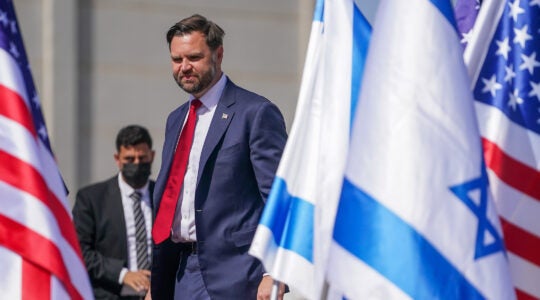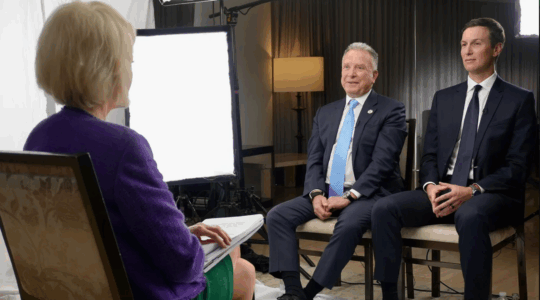(JTA) — The U.S House of Representatives, in a near-unanimous vote, approved legislation to impose sanctions related to Iran’s ballistic-missile program.
The bipartisan measure, which passed Thursday by a 423-2 vote, requires the administration to sanction Iran for undertaking “any activity related to ballistic missiles designed to be capable of delivering nuclear weapons, including launches using such ballistic-missile technology.”
It also calls on the U.S. government to identify and impose sanctions on companies and individuals — both inside Iran and internationally — that aid or supply materials to the missile program. It largely replicates or enhances existing sanctions.
The bill was sponsored by Rep. Ed Royce, R-Calif., and Rep Eliot Engel, D-N.Y., respectively the chairman and the ranking Democrat on the House Foreign Affairs Committee.
On Wednesday, the House passed three other Iran-related measures, all targeting the Iranian-backed Hezbollah militia in Lebanon, which lawmakers have described as Tehran’s “terrorist proxy.”
One bill passed Wednesday by voice vote, H.R. 3329, also launched by Royce and Engel, would require the administration to impose penalties on entities, including financial institutions and foreign government agencies, that support Hezbollah which has received support from Iran.
Sanctions options include freezing U.S. assets, denying entry into the United States, barring imports and exports, restrictions from participating in federal contracts and imposing criminal or civil penalties. Like the Iran bill, many of the Hezbollah sanctions passed Wednesday replicate or enhance existing U.S. sanctions.
Also passed by voice vote was H.R. 3342, which would direct the president to impose economic sanctions on members of Hezbollah who have used human shields and bar those individuals from entering the United States.
A third measure was a non-binding resolution, initiated by Rep. Ted Deutch, D-Fla., the top Democrat on the House Middle East subcommittee, that urged the European Union to declare Hezbollah in its entirety a banned terrorist entity. He said a 2013 R.E. designation of Hezbollah’s “military wing” as terrorist, allowing Hezbollah’s so-called civilian arm to continue to function in Europe, was a “false distinction.”
“It is one unified Hezbollah that is responsible for the horrific acts of terror against Europeans, Americans, Israelis, and others across the Middle East and around the globe,” Deutch said on the House floor. “It is one unified Hezbollah that has helped prop up the Assad regime, and that is complicit in the death of half a million Syrians and the dissolving of a once thriving nation.”
Royce in a statement Thursday after the Iran vote said the four legislative actions sent a direct message to Iran.
“Yesterday, the House cracked down on Iran’s leading terrorist proxy, Hezbollah, which Iran uses to spread terror and undermine regional stability,” Royce said. “And today, we passed my bill targeting Iran’s intercontinental ballistic missiles program. These sanctions will squeeze Iranian and foreign companies, banks and individuals that support the Iranian regime’s illicit weapons programs. Iran must know that the United States will not tolerate its dangerous behavior.”
Royce and Engel opposed the landmark nuclear agreement when it was signed in 2015, but both have said it is best to continue with the deal now that it is in place.
Under the terms of the accord, Iran agreed to curtail its nuclear activities in exchange for relief from international sanctions.
The vote in the House comes after Trump on Oct. 13 refused to certify that Iran is complying with the deal, accusing Tehran of violating the “spirit” of the agreement.
Trump did not immediately pull the United States out of the deal, instead pushing the matter to Congress and instructing lawmakers to strengthen a 2015 U.S. law to put additional pressure on Iran and asking international partners to modify the original agreement.
The president threatened he would pull out of the accord if significant changes were not made. Republicans in Congress are trying to advance legislation that would effectively amend the deal. Democrats have vowed to block such amendments and other parties to the deal, including U.S. allies in Europe, have said that the deal is done and cannot be reopened. The Democrats and the Europeans are open, however, to squeezing Iran further through non-nuclear related sanctions.
Israel under Prime Minister Benjamin Netanyahu vocally opposed the deal promoted by then President Barack Obama. Netanyahu said the deal, and especially the fact that some of its terms are limited to 10 years, “pave Iran’s path” to nuclear weapons. But Obama said the deal was the best means of blocking that path.
JTA has documented Jewish history in real-time for over a century. Keep our journalism strong by joining us in supporting independent, award-winning reporting.





